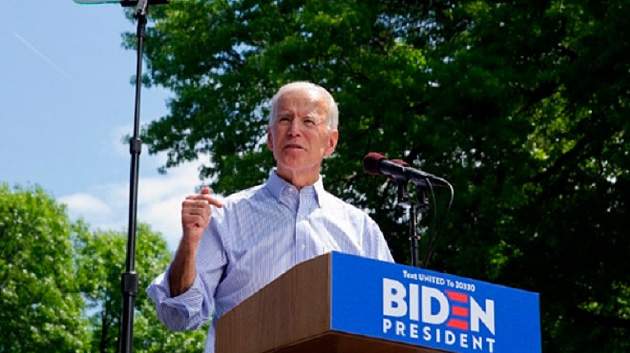China Will Assume Hegemony if Biden Becomes President
by Hanako Cho
Key Points of This Article
- Former Vice President Joe Biden’s extreme underestimation of threats from China
- Possibility of allowing nuclear possession in North Korea and Iran
- Bringing in an ideology of an “America that does not fight” into the party platform
If Democratic hopeful Joe Biden becomes the next U.S. President, how will he deal with threats from China? Unfortunately, based on past statements from Mr. Biden and the Democratic Party Platform, there is very little hope.
The Democratic Party Platform states that “the China challenge is not primarily a military one.” This attitude completely matches statements made by Mr. Biden’s guardian spirit, recorded in
Spiritual Interviews with the Guardian Spirits of Biden and Trump.
Mr. Biden’s guardian spirit stated some points including, “Even if China is expanding its military, right now it’s for defense… I think it’s impossible for China to surpass the U.S.,” which revealed his poor awareness against threats from China. This completely differs from the Trump administration that views the Chinese threat as more severe than that of the Soviet Union.
Repeating Obama’s Nightmare
If the Biden administration becomes a reality, trustworthy cabinet members from the Obama administration will surround the president. The following names have been mentioned thus far:
- John Kerry (Secretary of State)
- Antony Blinken (Deputy Secretary of State)
- Kurt Campbell (Assistant Secretary of State for East Asian and Pacific Affairs)
- Michele Flournoy (Under Secretary of Defense for Policy)
- Thomas Donilon (National Security Advisor)
- Susan Rice (National Security Advisor)
- Ben Rhodes (Deputy National Security Advisor and Foreign Policy Speechwriter)
- Jake Sullivan (Vice President Biden’s National Security Advisor)
It is highly likely that the traditional Democratic Party’s international cooperation policy will return and the foreign policy and security policies under the Obama administration will be continued.
Looking back at the times of the Obama administration, “numerous negative effects can be remembered,” said Happy Science University (HSU) associate professor of security studies, Seiji Kawada. Associate professor Kawada made the following comment:
“President Obama talked of policies that will shift military power to East Asia, known as ‘Asia Pivot’ (later known as Asia Rebalance), but never went along with those plans even after several years. His decision to cut national defense spending for 10 years in order to better the stagnating economy was the primary reason for this. Furthermore, he didn’t go through with the Freedom of Navigation Operation as well because he wanted to avoid rousing China. In the following year after Mr. Obama announced that ‘America is not the world’s policeman’ in 2013, China started the construction of artificial islands in the South China Sea. They saw weakness in the U.S. and took actions to force their way through.”
No Intention to Defend Taiwan
Biden talks of aligning with allies to put pressure on China. This sounds pleasing to the ears, but where does his true intention lie?
One hint to reveal this comes from a statement from Antony Blinken, former Deputy Secretary of State and Mr. Biden’s current head advisor for foreign policy, who is expected to assume a key position if a Biden administration were to arise. Regarding the relationship with China, as well as Taiwan, Mr. Blinken said that the U.S. hopes to “get the balance back,” in an interview with CBS News.
In short, Biden views that the current administration’s support of Taiwan upsets China, so it is better to do as little as possible to keep the situation from escalating. Depending on the course of negotiations with Taiwan, it is possible to loosen up defense in Taiwan.
Meanwhile, the Trump administration approved the sale of the latest fighter jet F-16 to Taiwan, which was previously rejected by the Obama administration; they also took politically and militaristically effective actions, such as the sales of missiles, mines and unmanned surveillance aircrafts and having high-rank government officials visit Taiwan.
Furthermore, a paper written by a former Under Secretary of Defense for Policy, and the most likely candidate for Secretary of Defense in the Biden administration, Michele Flournoy, recently gathered public attention. His publication was titled “How to Prevent a War in Asia” and published in a foreign policy magazine, “Foreign Affairs.”
In the magazine she claimed that the risk of conflict in Asia will increase depending on the deterrence by the U.S. She stated that there should be competition in the areas of economy, technology, politics and ideology, which prompted comments from various groups that the foreign and military policy differences between the Republican Party and the Democratic Party has shrunken.
However, as Mrs. Flournoy also mentioned, the Chinese government is testing the U.S.’s capacity and will. If Mr. Biden, who plays a key role, doesn’t have a strong will to protect its allied nations, this deterrence would not work.
In the previous spiritual reading, Mr. Biden’s guardian spirit merely pointed out that there is the possibility of Hong Kong, Taiwan and Japan becoming battlefields, and the willpower could not be observed.
Furthermore, Mrs. Flournoy’s essay concluded that a U.S.-China conversation was essential, placing hope in negotiations. It’s obvious that we must maintain diplomatic routes, but it is too naïve to believe that the other side will change; this perception will most likely repeat the failure of the U.S.-China engagement policy that has continued for the last 40 years.
North Korea’s Nuclear Bombs May Be Legitimized
In addition, the Obama administration, which advocated “strategic patience” with North Korea, attempted to negotiate with North Korea through the multilateral six-party talks. The negotiation continued to Dutch roll, which earned valuable time for North Korea to continue its nuclear development, similar to what happened during the Bush administration.
In regard to this, Susan Rice, a former National Security Advisor who is expected to play a key role in the Biden administration, wrote in a 2017 New York Times article that “it is highly unlikely to relinquish [North Korea’s] sizable arsenal.”
She may have directly looked at the threat of North Korea’s nuclear weapons, but this kind of approach is contrasting to that of the Trump administration who portrayed a democratized future to Kim Jong-un, Chairman of the Worker’s Party of Korea. Her statement rather acknowledges North Korea’s holdings of nuclear weapons.
A similar observation can be made about the Iranian policies. A policy plan outlines a return to the “Iran nuclear deal,” which not only leaves a path for Iran to become a nuclear power in the future but for its neighboring countries as well. The platform calls for nuclear non-proliferation, but it would actually lead to the opposite direction. Realism without an ideal cannot create a just world.
Party Platform Will Limit President’s War Power and Head Towards “America That Does Not Fight”
The 2020 Democratic Party Platform also includes an item that requires “parliamentary approval” when sending the U.S. military to hostile regions, which follows the guidelines set by the War Powers Act of 1973.
This was an item in existence in the 2016 Party Platform and shows the influence of the left wing. For instance, in 2013 when Syria’s Assad Regime used chemical weapons on its own citizens, President Obama consulted with Congress and did not carry out air strikes.
Mr. Obama himself created a “red line” that he would attack Syria if they used chemical weapons but did not follow through with this threat. “Justice” against the Assad Regime’s “evil” was not carried out. Not only that, but Syria went under Russian control, which allowed them to grow.
The Congress approval that follows the guidelines from the War Powers Act was included to prevent wars such as the Afghanistan War that is both large-scale and costly. However, including “parliamentary approval” that previous presidents deemed unconstitutional into the party platform will most definitely bring about an America that cannot fight.
When combined with the national defense budget cut, it is no exaggeration when we say that the declaration that “the U.S. is no longer the world’s policeman” is woven into the program.
Biden’s Victory May Cause Stock Market Crash Followed by Depression
Mr. Biden has also proposed a tax increase of four trillion dollars over 10 years. He is planning to increase the capital gains tax rate to 39%, which is approximately double the current rate, and the federal corporate tax rate to 28%, which exceeds the Organization for Economic Co-operation and Development (OECD) average.
A tax increase during a recession may lead to another Great Depression, similar to the year 1929. When the Trump administration’s victory seemed definite in the 2016 presidential election, the stock market prices soared. If a Biden administration arises, an opposite, sharp fall in the market can be expected which will lead to the depletion of pension funds and national defense spending cuts as an attempt at remedial measures.
How will the U.S. respond against China’s expanding power at that time? Mr. Biden talks of relying on “allied nations,” but this kind of policy is reminiscent of Mr. Obama’s saying, “leading from behind.” In short, it is a message to the allies to not count on U.S. leadership.
Stated briefly, Mr. Biden has fallen into appeasement, similar to the British Chamberlain administration that allowed the rise of the Nazis.
Meanwhile, President Trump has a strategy that aims for the collapse of the Chinese Communist Party and looks at its democratized future, similarly to that of British Prime Minister Churchill who threw away policies of appeasement and plausible realism, believing that it was justice to overthrow Hitler.
Mr. Trump’s guardian spirit stated, “At the very least, we, meaning Master Okawa and myself,
want to fulfill our responsibility of keeping systems that uphold freedom, democracy, and faith mainstream in the world, not just through the 21st century, but into the 22nd century as well.” (“Spiritual Interviews with the Guardian Spirits of Biden and Trump”).
Some experts have said that the current China policy will remain intact even if Mr. Biden becomes president. However, as China threatens to start a war, if someone who is not fit as the highest commander is president, then we will enter an age of China’s world domination.
According to a survey, 56% of people who plan on voting for the Democratic Party stated that their rationale was that “they didn’t like Trump.” However, the 2020 election is one of historical importance that will determine the course of China’s democratization. Who is the most capable commander in chief who is truly trying to realize world justice? The U.S. citizens must not misunderstand their choices.




















